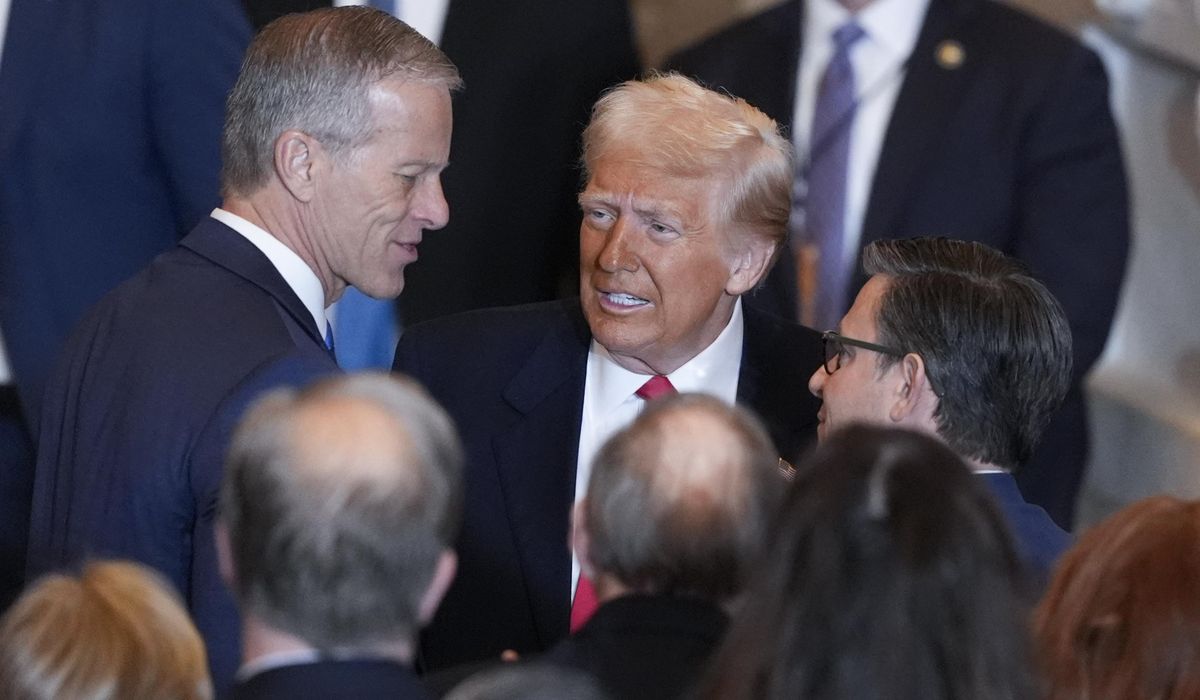House Republicans leave marathon White House meeting with ‘no final agreement’ on budget blueprint

House Speaker Mike Johnson and a team of House Republicans spent hours in a closed-door meeting with President Trump on Thursday, but left without a finished plan on how to advance his agenda.
House Republicans have been working for weeks to smooth over their internal differences and move forward with a budget resolution, the first step in passing Mr. Trump’s agenda. However, disagreements among differing House GOP factions on spending levels, cuts and tax policies have slowed their progress and delayed their timeline.
Not even Mr. Trump could help them seal an elusive agreement, but Republicans leaving the meeting at the White House still felt that progress had been made after the president’s push toward compromise.
“He set a tone,” House Budget Chairman Jodey Arrington, Texas Republican, said in describing Mr. Trump’s perspectives. “We have to remember that this is about the American people. This is about what it’s going to do for the country, and that the only way this gets done is if everybody grabs the rope and pulls and makes the accommodations that are necessary for everybody, gives and takes.”
The meeting lasted for roughly five hours — so long that a scheduled meeting between Mr. Johnson and Israeli Prime Minister Benjamin Netanyahu was canceled. It was rescheduled for Friday morning.
The president did not stay the entire time but participated for “a good while,” providing lawmakers with guidance and direction, then left them to their own devices to work out the details, Mr. Arrington said.
Mr. Arrington said Republicans left the meeting closer to setting a floor for spending cuts in the budget blueprint, which has been a key hangup, but they have “no final agreement.” He declined to give other details.
Nonetheless, he was optimistic that Republicans would resolve the remaining hang-ups, and he said he plans to hold a markup of the budget next week. The budget resolution provides spending and revenue instructions for committees to pursue in drafting reconciliation legislation, which is exempt from a Senate filibuster.
Mr. Johnson also would not share the details of what was ironed out with the president, but said that Mr. Trump started off the summit and “sort of set the table for the discussion.”
Lawmakers “got out the white boards” and worked out the framework for what they believed would be the best path forward, he said.
Still, they have more work to do. Mr. Johnson said he and other House Republicans would meet later Thursday night to “finish up some final details,” and expected that a budget resolution would be ready to go through the House Budget Committee by as early as next Tuesday.
Senate Republicans announced Wednesday they would mark up their own budget resolution next week that would split Mr. Trump’s agenda into two bills, setting up a collision course with both chambers working on dueling blueprints.
“Our message to our friends and colleagues in the Senate is allow the House to do its work,” Mr. Johnson said. “We are moving this as quickly and as expeditiously as possible. Very positive developments today. We’re really grateful to the president for leaning in and doing what he does best, and that is put a steady hand at the wheel and get everybody working.”
Mr. Arrington said Senate Majority Leader John Thune, South Dakota, has given the House space to maneuver, given political differences in the lower chamber, and that his decision to move an alternative budget resolution is just a “healthy push” to accelerate compromise.
“That’s healthy to have that sort of hanging in the backdrop as we work on one, that if we don’t get our work done, and if we don’t get to a deal with the ink dry on it and a markup, then we know that they’re ready to go at any time,” he said.
House Majority Leader Steve Scalise, Louisiana Republican, called the meeting “productive” and noted that Mr. Trump was “very bullish” on reining in spending and having a stable tax code.
While the details of the tax package won’t be hashed out until after the budget blueprint is adopted, Mr. Trump laid out his priorities, which includes promises from his campaign for no tax on tips, overtime or Social Security income, White House press secretary Karoline Leavitt told reporters.
Others included adjusting the $10,000 cap on the state and local tax, or SALT, deduction; eliminating special tax breaks for billionaire sports team owners, closing the carried-interest tax deduction loophole and cutting taxes on products made in America.
“This will be the largest tax cut in history for middle-class working Americans. The president is committed to working with Congress to get this done,” Ms. Leavitt said.
Mr. Scalise confirmed that the conversation went beyond crafting a budget resolution and delved into some of the finer points of the budget reconciliation process, like what the final sweeping tax bill would look like.
“It’s not just what will the targets be in the budget,” he said. “It’s okay, but then what’s going to happen in the tax bill? What things can we make permanent? How far can we go on some of the savings?”
Still, there was no resolution among lawmakers on major issues, like the spending floor or whether to include instructions for a debt limit increase — another key priority for Mr. Trump — or to leave that issue out of the partisan bill and hope for a separate bipartisan deal.
“We got really close on a lot of those things,” Mr. Scalise said. “We’ve definitely talked about those items, but we… still have to get some of these other questions answered with members who weren’t in the room to go and finalize that.”


